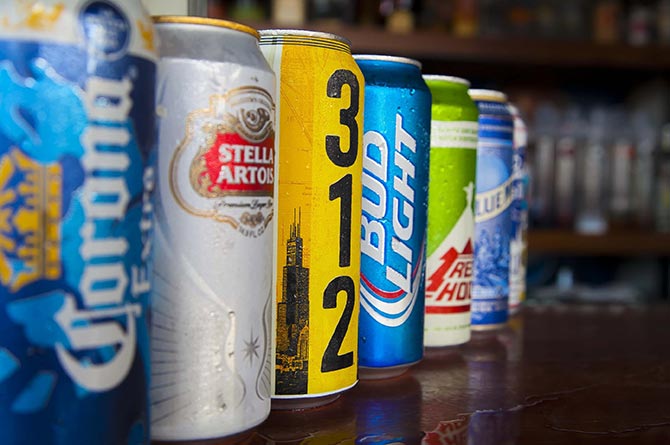Support quality, independent, local journalism…that matters
From just £1 a month you can help fund our work – and use our website without adverts. Become a member today

By Katy Holloway, University of South Wales and Wulf Livingston, Wrexham Glyndwr University
Almost five years ago, a new law came into force in Wales making it illegal to sell alcohol for less than 50p per unit.
Since its introduction, we have been evaluating the effects of minimum alcohol pricing and our findings have recently been published. These will help Welsh Government ministers decide on the future of the policy beyond its six-year trial period.
The price of many alcoholic drinks in Welsh shops increased in March 2020. Most noticeably, large three litre bottles of strong white cider (containing 22 units of alcohol) rose from less than £5 to £11.
The price of some beers, wines and spirits also increased, though to a lesser extent. In pubs, clubs and restaurants, the introduction of minimum pricing for alcohol made little difference, as prices were already well above the 50p per unit threshold.
The main goal of the Public Health (Minimum Price for Alcohol) (Wales) Act 2018 is to reduce alcohol-related harm and protect the health of those regularly drinking more than the recommended 14 units per week.
Contrary to popular belief, minimum pricing for alcohol is not a tax. This means that any extra money from higher prices goes to the retailers and producers, not to the Welsh government.
While many people enjoy drinking alcohol without any problem, some patterns of alcohol use are associated with significant physical, mental and social harms. It costs UK society more than £27 billion a year through a combination of health, crime, workplace and social welfare costs.
Research has shown that making alcohol less affordable can reduce consumption and hence related harms. The World Health Organization considers minimum pricing one of its “best buys” for tackling harmful alcohol use.
While minimum alcohol pricing is in place in several countries, policies differ. In 2018, Scotland became the first country to introduce a national minimum price for all types of alcohol. Two years later, Wales followed suit.
The Republic of Ireland introduced minimum pricing in January 2022, while Northern Ireland has been engaged in consultation on the policy for several years. There are no plans for the introduction of minimum pricing for alcohol in England.
The policy was introduced in Wales primarily to protect hazardous and harmful drinkers, who tend to consume more low-cost, high-strength alcohol. But evaluating its effect has been complex, especially due to the Covid pandemic, which disrupted drinking habits and the availability of alcohol. Other economic factors, including the cost-of-living crisis, have also influenced affordability.
What we found
Many of the findings within the 11 reports from our Welsh evaluation have strong resonance with those elsewhere, particularly those of the final Scottish evaluation.
Drawing from our research, we have five important findings. First, implementation in Wales has been smooth. Retailers have largely complied with the law, and enforcement has been effective.
Second, certain cheap alcohol products have disappeared. Large bottles of strong cider, for example, are now rare. There have also been shifts in promotions and product availability.
Third, there are indications that overall alcohol consumption in Wales has declined. While it is difficult to measure directly, purchasing data suggests a reduction.
Fourth, concerns about unintended consequences have not materialised significantly. Predictions of a rise in home brewing, substance switching, shoplifting and cross-border purchasing have not been widely observed. While some people living near the border have bought alcohol in England, this appears to be opportunistic rather than nationwide.
Finally, some drinkers have changed their purchasing habits. A minority have switched from cider to wine or spirits as price differences narrowed. Others, particularly those on low incomes, experienced further struggles in financially maintaining their drinking habits.
Our recommendations
Minimum pricing for alcohol is well supported by evidence. It is not without its critics, especially those citing continued trends in actual numbers of alcohol-related deaths. Its implementation in Wales has noticeable effects, most of which are positive.
Based on our findings, we recommend that the Welsh Government retains minimum alcohol pricing. But we also recognise the need for some adjustments.
The 50p per unit price, set over a decade ago, should be reviewed. Our evidence suggests an increase in price is needed to maintain the policy’s effectiveness. We believe the policy needs to be accompanied by well-funded treatment and support services for people experiencing alcohol-related difficulties.
Policymakers must also acknowledge the disproportionate effect of minimum alcohol pricing on those with the lowest incomes. But this should not be a reason to abandon it. We do not advocate for making unhealthy foods cheaper to tackle food poverty. The same principle applies to alcohol policy.
Minimum alcohol pricing targets affordability rather than addressing all aspects of alcohol harm. It is not a silver bullet, and so should only be one component of comprehensive strategy delivery. If combined with other policy measures and social support, it has the potential to significantly contribute to reductions in alcohol-related harm in Wales.
Katy Holloway, Professor of Criminology, University of South Wales and Wulf Livingston, Professor of Alcohol Studies, Wrexham Glyndwr University
This article is republished from The Conversation under a Creative Commons license. Read the original article.
Support quality, independent, local journalism…that matters
From just £1 a month you can help fund our work – and use our website without adverts.
Become a member today
